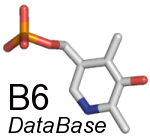|
|
| type |
Journal Article |
| authors |
Tsai, D. S.; Arteca, R. N.; Bachman, J. M.; Phillips, A. T. |
| title |
Purification and characterization of 1-aminocyclopropane-1-carboxylate synthase from etiolated mung bean hypocotyls |
| journal |
Arch Biochem Biophys |
| Activity |
4.4.1.14 |
| Family |
4.4.1.14.a |
| ui |
Pcacseh |
| year |
(1988) |
| volume |
264 |
| number |
2 |
| pages |
632-40 |
| | |
|---|
| keywords |
Adenine/analogs & derivatives/pharmacology |
| abstract |
1-Aminocyclopropane-1-carboxylate (ACC) synthase, EC 4.4.1.14, was purified to homogeneity from etiolated mung bean hypocotyl segments. This was made possible by the ability to elevate the enzyme level markedly through hormone treatments and by stabilization of the enzyme with high phosphate concentrations. The four-step procedure resulted in 1050-fold purification with 25% yield, and consisted of stepwise elution from hydroxylapatite, chromatography on phenyl-Sepharose CL-4B, gradient elution from hydroxylapatite, and fast protein liquid chromatography (FPLC) on a MonoQ anion-exchange column. FPLC-purified ACC synthase migrated as a single band of Mr 65,000 on denaturing polyacrylamide gel electrophoresis. The molecular weight of native enzyme by Bio-Gel A-0.5 M chromatography was 125,000, indicating that the enzyme probably exists as a dimer of identical 65,000 Mr subunits. The mung bean ACC synthase exhibited a pH optimum of 8.0 for activity and a Km for S-adenosylmethionine (AdoMet) of 55 microM at 30 degrees C. It exhibited an Arrhenius activation energy of 12 kcal mol-1 degree-1 and was inactivated at temperatures in excess of 40 degrees C. The specific activity for pure ACC synthase was 21 mumol of ACC formed/mg protein/h when determined under optimal conditions with 400 microM AdoMet. |
| last changed |
2018/11/27 10:21 |
|











